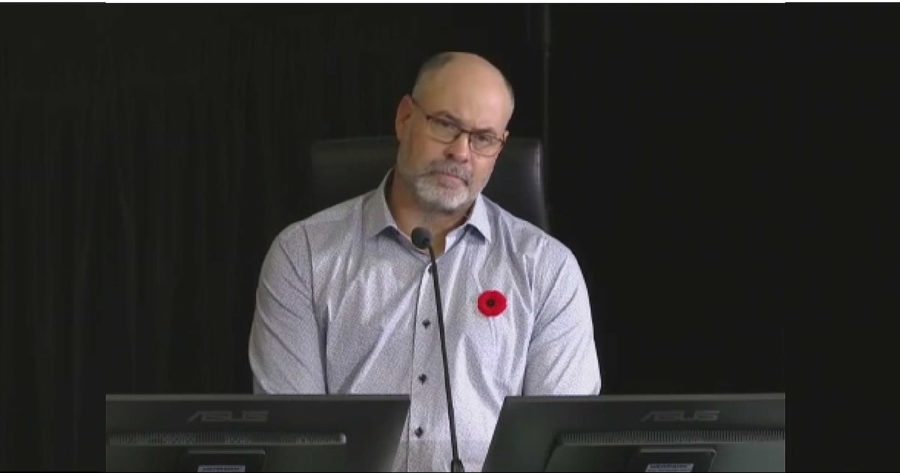submitted by Anne Thompson
Protection of Seniors in Care appeals the decision of the Executive Director made on March 07, 2023, re: File No. 5489066, for the following reasons:
“Trust is the foundation upon which the legitimacy of public institutions is built and is crucial for maintaining social cohesion,” according to the Organisation for Economic Co-operation and Development (OECD), an international organisation that works to build better policies, and in which Canada had been a Member since 1961.
I apologize to you, Members of the Appeal Committee of Management Council of Legal Aid Manitoba for my common manner.
I am nowhere near as learned in law as are you, and am not familiar with these formal matters at all. I am a simple person who strongly believes that in Canada, in my role as a member of the public, each of us has a part in ensuring that the law works properly and that justice is done.
For these reasons I beg your indulgence and patience as, in my role as Instructing Party, I go through this appeal process on behalf of the grassroots non-profit group of Manitobans unable to stop the effects of the passage of time, nor with the ability to foretell when or if we will lose our ability to earn a livelihood sufficient to enjoy life, liberty and our own assurances of security of the person to then become so vulnerable as to rely solely upon the pleasures of the state and the assurances given us in legislation and from the courts.
We understand that you are a small office with limited resources and a specific mandate with case selection criteria developed to ensure that you use your limited resources in a way that will most efficiently advance your mandate.
We have no knowledge as to your office’s existing case load. We can see, though, that the potential benefits of this case will undoubtedly outweigh its costs in terms of staff and financial resources, that this case will affect either negatively or positively the protection of the health and wellbeing of seniors, a growing segment of our society, and that the circumstances of this case permit that it can be the test case that raises a systemic issue in the law. We hope the words used here in this appeal will clearly allow you to perceive this matter in the same way.
My peers and I are quite concerned, fearful in fact, about the quality of care to which we anticipate being subjected when our time comes, given the many, many frightening accounts related by family and friends, reported in the media, and available through publicly accessible documents, such as the report submitted by Manitoba Liberal Caucus Seniors Advocate Report January 2021, of the negative consequences of neglect in personal care homes in Manitoba because of the lack of action from the investigative arm of our justice system into what appears to be a systemic issue stemming from philosophy and in legislation that results in no ultimate accountability being claimed or assigned.
There is everything in the public arena that gives even the lay person the appearance of a system allowing a culture of indifference that enables inadequate and second-rate service delivery to be accepted as the norm and thus allow for so little value placed on the quality of life for sick and elderly vulnerable individuals.
I shall endeavor to advocate and present a straight logical argument about what the law is and what the facts are in a way of persuading any judge that our group’s request for assistance for a judicial review deserves the support of Legal Aid Manitoba.
Judicial review of administration action occurs where someone objects to the decisions made by a public actor. Thus, what mandamus means is that the court is ordering someone to do something that they are required to do, but for whatever reason, they aren’t doing now. This solemn and serious request for the court’s input has only become necessary because the reason whoever is not doing what they are supposed to is due to a combination of lack of legal expertise and bad drafting (the way the legislation was worded). Ministers of the Government of Manitoba are presumed to know how legislation works, and thus expected to be able to understand and abide by any legal requirements with unquestioned obedience, and without any judicial assistance.
The Court of King’s Bench is our last recourse to make the government department entrusted with the protection of citizens in long-term care in Manitoba, through enforcement of our laws, fess up to their part in government’s duty to provide a safe society for all. To the best of my knowledge, we have followed the chain-of-command, blowing a whistle, alerting all persons along the way. We’ve called the cops, as it were. But the Westray case has taught us is that it is the appropriate provincial authority and not the municipal police who needs to investigate in order to determine whether or not there has been a contravention of any part of The Protection for Persons in Care Act, (the Act).
The public education benefit of this action is when all persons in Manitoba are educated to the fact that legislative commandments, like their theological counterparts (by establishment of very long-standing practice in common-law countries around the world), are signified by the word “shall”, and for the same reason!—it is meant to ordain that there is not and never will be a space for wiggle room. And, having adopted this language for essentially the same reasons, when assigned a duty as when a law sayeth “thou shalt” (or “thou shalt not”), the implication of an absolute duty requiring unquestioning compliance is exactly the same (“a duty to protect”; “a duty to report”; “shall promptly report”).
On the Government of Manitoba web page can be found the incorrect, imprecise statement that “The Protection for Persons in Care Office (PPCO) of Manitoba Health receives and investigates reports of suspected patient/resident abuse and neglect.”
The exact legal requirement to engage the PPCO according to the Act is not that the Office is able to conclude that a patient may have been abused or neglected. No. Under “Duty to report abuse or neglect” 3(1), A service provider or other person who has a reasonable basis to believe that a patient is, or is likely to be, abused or neglected shall promptly report the belief, and the information on which it is based, to the PPCO.
Cognisant of the fact that under Canadian law, a corporation is considered to be a legal person who can own property, borrow money, pay taxes, hire employees, and commence or be subject to a lawsuit, we have focused on Revera Incorporated because their hubris invites attention and this action. We seek to encourage, enrich and empower a system of the administration of justice under the rule of law with consistent accountability for all persons.
I reported to the PPCO the reasonable belief, shared by my peers and I, that a patient was likely to be neglected because of the choices made by the person, Revera Incorporated. We believe that investigation will show other owners, perhaps even Extendicare (Canada) Incorporated, also allowing this same aforementioned culture of indifference to the adherence to laws, rules and/or standards that tacitly permits inadequate, second-rate and sub-standard service delivery to be accepted as the norm – and thus allow for so little value to be placed on the holistic safety (meaning physical, mental, psychological, and environmental safety) and quality of life for sick and elderly vulnerable individuals.
We, through me, then communicated with the Manitoba Law Reform Commission (the Commission) to request that they investigate our concern. The Commission has a process for members of the public to submit suggestions for investigation which relies upon members of the general public having the time, knowledge and ability to first determine what needs to be investigated, as well as on the vagaries of the Commission’s decision process, including that the Commission might “take a different path” on what ought to be investigated, as we have also experienced. The Manitoba Law Reform Commission did, indeed, investigate; however, they investigated elder abuse in the community and not in long-term care facilities. (Elder Abuse and Neglect in Manitoba; Consultation Paper; June 2021)
Our next step was to ask the Minister of Justice and Attorney General for Manitoba in February, 2021 whether or not the Government has the ability to investigate a corporation licensed to operate a long-term care facility, and also whether or not a corporation with expertise in elder care has an obligation to report the likelihood of abuse or neglect. These queries were passed to the Minister of Health’s Office. The Assistant Deputy Minister of Health instructed us to report our concerns to the PPCO.
Through me, we then approached the Office of the Auditor General who happened to have already to have started an examination focusing on how the PPCO receives and investigates concerns received from the public or healthcare staff regarding the level of care provided in Manitoba Personal Care Homes. As much as we believe they will be able to determine to what extent Manitobans may or may not be getting their money’s worth insofar as care service delivery to elders is concerned, they are not the appropriate investigative enforcement branch of the provincial government to address our concerns.
In May of 2022, we decided to begin the process of requesting assistance from Legal Aid Manitoba through the Public Interest Law Centre to assist us in obtaining a judicial review of the Act because we believe that either the law is badly written—hence our first step of turning to the Manitoba Law Reform Commission—or that an actor needs to be compelled to investigate our sincere and serious concern of the likelihood of harm secondary to neglect, especially at a Revera Incorporated-run facility, once a Manitoban is panelled for admittance into a long-term care facility.
As Manitobans seeking to serve and protect all Manitobans by helping maintain a safe society that supports personal responsibility and respect by and for all persons in Manitoba, we object to the decision of the Assistant Deputy Minister of Health and Seniors Care, Avis Gray, who responded on behalf of the Minister of Health and Seniors Care Heather Stefanson, who oversee the Protection for Persons in Care Office (PPCO), to not initiate an investigation into the choices of behaviour of the person named Revera Incorporated, given our concerns about the many public reports of experiences of harm to residents of long-term care facilities, and, for the most part, reported to be caused by a lack of appropriately trained staff which shows a failure to provide residents the ‘necessary nursing services’ called for in Personal Care Services Insurance and Administration Regulation, M.R. 52/93, Schedule A, 3. Necessary nursing services.
When stating, in the letter from Peter Kingsley, Executive Director of Legal Aid Manitoba, that no-one in the group has any personal direct knowledge of any breach of duty, in this case and under these circumstances, does Legal Aid Manitoba include our group’s Charter rights (full name: Canadian Charter of Rights and Freedoms) and a government’s fundamental duty to protect its citizens?
To evoke Lord Sankey’s phase in Edwards v. Attorney-General for Canada, [1930] A.C. 124 (P.C.), at p. 136, the Canadian Charter must be viewed as “a living tree capable of growth and expansion within its natural limits.” Even though there is nothing in the jurisprudence thus far suggesting that section 7 place a positive obligation on the state to ensure that each person enjoys life, liberty or security of the person, in the name of the vulnerable elders for whom I speak, I beg of you to consider the following reasoning.
Since it is accepted that section 7 of the Canadian Charter of Rights and Freedoms’
- application has been interpreted as restricting the state’s ability to deprive a person the enjoyment of life, liberty or security of the person;
- application is qualitative and not quantitative;
- meaning of security of the person has both a physical and a psychological aspect; and
- meaning of liberty also encompasses freedom from the threat of future suffering because it can deny deportation to a substantial risk of torture,
then the question at hand here is, does the state’s inactivity, the state’s failure to act to initiate an investigation into the cause of the reports of experiences of harm—especially those reports published in the Winnipeg Free Press—deprive a Canadian of security of the person when the Canadian faces the strong possibility of a future inability to earn a livelihood sufficient to secure for their own self or for their loved one the enjoyment of life, liberty and security of the person?
In other words, to ascertain whether any one of our group has any personal direct knowledge of any breach of duty owed us would be to ascertain whether the circumstances presented here—including a Canadian with no ability to earn a livelihood sufficient to secure for their own self or for their loved one the enjoyment of the security of the person that brings liberty from the substantial risk of future experience of harm secondary to neglect should one become a resident in a long-term care facility coupled with the appearance that the minister responsible and their delegate, the PPCO, are unwilling or unable to investigate whether a corporation has or has not transgressed Manitoba legislation, specifically either section 2 the Act, which requires the owner to “maintain a reasonable level of safety”, or section 3 of the same Act, which requires a service provider or other person to report to the minister or their designate the belief that a patient is likely to be abused or neglected—warrant a novel application of section 7 as the basis for a positive state obligation to guarantee adequate security of the person with the assurance of active enforcement of the Province of Manitoba’s regulations and laws which includes the ability to actively investigate any person seen to be engaged in wrongdoing.
I hope this helps explain why my peers and I are scared about our future: if the enforcement branch will not enforce, hope is lost to us, for there would be no evidence of reciprocity of trust in government institutions in this aspect of our society, and without enforcement of the rules, laws and standards, that with no-one enforcing our laws, rules and standards there can be no security of the person in fact or in expectation.
Given the above information, that harm is occurring in long-term care facilities; that fear exists in older vulnerable Manitobans incapable of stopping the passage of time or the substantial risk of harm secondary to neglect as our senescence, our physiological progress through time, continues; and that subsequent to requests for investigation, there is no actor enforcing the provisions of the law; and, now, after the initial refusal of support for assistance with the Courts, can you, Members of the Appeal Committee, aver that no-one of us has therefore been denied the most fundamental of duties: that duty of a state to protect its citizens?
We believe in the likelihood of success in obtaining a judicial review, given the public quote by a Revera executive admitting control of funds for staffing, the above-mentioned fettering by an administrative body binding itself to policy or to the views of others not written in law, and the repetition of the same behaviour by a service provider of not fulfilling the duty to inform. This simple act of non-communication by a service provider with self-reported expertise in elder care has resulted, and I dare say, will continue to result in negative impacts on the wellbeing and on the lives of Manitobans in long-term care as well as to those who survive them.
We have been heartened by believing that the Public Interest Law Centre (PILC) has a focus on access to justice in civil matters, especially for members of a vulnerable population such as are humans in care. We look forward to witnessing the Public Interest Law Centre represent low-income Manitobans, including those living with mental and/or physical disabilities, and especially senior citizens as a group, and thus demonstrate how the PILC works to enhance the lives and the law for all Manitobans.
And finally, this matter of paying the piper.
As altruistic as I am to give of my efforts and of my time, though, I will not consent to a lien placed on my land and my little 545-square-foot house located in one of the poorest neighbourhoods in Canada to cover the costs of this action.
Personally, I find the imposition of such a burden inhumane, and it also jeopardises my spouse’s security, this matter of public safety and public officer responsibility. The other members of our grassroots group find the demand incredulous, preposterous and illogical—to place on the shoulders of an older crippled adult on a fixed, government-supplied income, the full burden of the cost of something that ought rightly to be placed at the feet of the legal community in Manitoba—for they have more than enough expertise, time, and ability to resolve this issue of the application of- and adherence to the law. And on a person whose mobility impairment is due to an on-the-job injury while in service to her community as a volunteer firefighter and volunteer ambulance attendant!
To paraphrase the Manitoba Department of Justice Guideline No. 5:PRI:1, the imposition of housing insecurity on such a Canadian, as described above, raises questions of access to justice issues and it also furthers the effects of financial segregation from it, from justice, that is.
To assist Legal Aid Manitoba and the Public Interest Law Centre with their mandate to represent eligible groups in cases which will have a broad impact on the application of the law and will affect groups of people, we could consider formalizing our grassroots non-profit organisation by incorporating it. But, that would beg the questions, “Does it take a corporation to oppose a corporation, or is it something a natural person can do through a grassroots organisation?”, “Is it not the fundamental role of government, who fund Legal Aid Manitoba, to elevate a citizen to the same level as the powerful, even itself?”, and, “Has Legal Aid Manitoba the ability to stand up against the government that helps to fund it?”
A Flowchart
1. Where is the transparency?
(a) is the law to protect persons in care sufficient to do the job of protecting persons in care
-
- if no, write a better law
- if yes, then
(b) is the minister responsible doing their job
-
- if no, make them do it
- if yes, then what the heck is up with all these reports of harm coming from multiple sources, and all this fear and distress coming from Manitoba seniors and the ones who love them, when perceiving the possibility of becoming a resident in a long-term care facility?
2. Where is the accountability?
(a) who is making sure that the law is being enforced and the minister is doing their job?
-
- there is no public actor* making sure that the law is being enforced, nor that the minister is adhering to the written legislation
- the Manitoba Law Reform Commission (the Commission) has a process for members of the public to submit suggestions for investigation which relies upon the general public having the time, knowledge and ability to determine what needs to be investigated, as well and the vagaries of the Commission’s decision process, including that the Commission might “take a different path” on what ought to be investigated, as I have also experienced
- the Commission has not initiated an investigation into negligence in long-term care facilities even after multiple publicly available and announced media reports of harm experienced by persons in care facilities, and although I spoke with the Commission office on this matter
- the Minister of Justice and Attorney General for Manitoba has the right and ability to refer any subject matter to the Manitoba Law Reform Commission, and although I wrote them as well, no investigation was initiated
(b) what is the recommended mechanism to make sure persons in care are protected
-
- the legal remedy is to continue with the case for a judicial review
- the political remedy is the establishment of a Manitoba Advocate for Seniors and Disabled Persons.
3. Why does this matter?
-
- Because Manitobans have the right to expect a safe, respectful, dignified, culturally- and gender-appropriate delivery of care services that match their individual needs from licensed/government sanctioned care facilities
- Because Manitobans need to have trust in responsible government where responsible government refers to a government that is responsible to the people
- Because trust is “the foundation upon which the legitimacy of public institutions is built and is crucial for maintaining social cohesion,” per the Organisation for Economic Co-operation and Development (OECD), in which Canada had been a Member since 1961
- Because reciprocity demands that since Manitobans have paid to be protected from harm, they are owed this protection, and Manitoba, as a member of the country of Canada, has to do their part to assure the security of the person
- Because Manitobans need to be able to trust that all persons connected to care service provision honour the tradition of the Hippocratic philosophy which became universal in the early 19th century
- Because, as social creatures, the presumption made by Manitobans is of trust in the expectation of conscientious choices of behaviour by the person who is the owner and/or controller of a long-term care facility, meaning that above all other considerations, this person shall do good or do no harm
- Because Manitobans expect society-at-large to adhere to this above-mentioned tradition through their government’s choice of actions
- Because legislative commandments, like their theological counterparts, are signified by the word “shall” to ordain that there is not and never will be a space for wiggle room, and that when assigned a duty the implication of an absolute duty requiring unquestioning compliance is exactly the same
- Because, since with no oversight a resident’s security of the person cannot be guaranteed, then it should be made known to any person being admitted to a long-term care facility of all possible inconveniences, hazards, and experiences of harm reasonably to be expected since there is no protection from the likelihood of harm secondary to neglect due to insufficient numbers of adequately trained staff to meet the individual needs and requirement of the residents
- Because, “Allowing a private citizen to bring an allegation of criminal wrongdoing before the court is an important aspect of our legal system. Denial of that opportunity raises access to justice issues.” per Manitoba Department of Justice Guideline No. 5:PRI:1
*an elected or appointed holder of a public office
**There was legislation in place to protect children and youth, and still, a Manitoba Advocate for Children and Youth (MACY) was created to advocate, investigate, and review public services in Manitoba to ensure they are meeting the needs of children, youth and young adults in Manitoba; nobody does this for Seniors or Disabled Persons whose needs are or become too great to be tended-to by family, or who find themselves unable to tend to their own needs by themselves: as vulnerable as though a child or a youth. The Manitoba Law Reform Commission was created in 1970 and the Office of the Children’s Advocate was established in 1992, (becoming the Manitoba Advocate for Children and Youth on March 15, 2018)
***means a person who has authority to affect how a person does a job or performs a task









